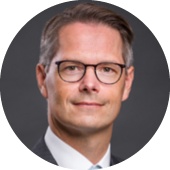This article was originally published on Paperjam. Read the article here.
As we have just closed another eventful year, focus is shifting to the next 12 months. Whilst long-term needs are unchanged, we continue to see major shifts in High Net Worth Individuals’ (HNWIs) approaches to wealth and succession planning, resulting in their advisers and service providers needing to transform, innovate and evolve.
Four key trends to watch:
1) Global inflation is here to stay
Strong inflationary pressures, driven by geopolitical uncertainty and an energy crisis, have significantly increased the risk of a global recession, with growing doubts over markets’ ability to deliver substantive growth in the short term. This potent mix means that central banks across the world are likely going to find themselves having to continue to raise interest rates, as the European Central Bank, Fed and Bank of England continue to signal.
On the other hand, there has been a significant amount of cash waiting in the wings ready to be invested. Crucially, continued fears of ‘cash erosion’, combined with private markets still being considered as a hedge against market volatility could well prompt further demand in private equity and other alternative assets.
The appetite for and exposure to alternatives, hunting higher returns and diversification from public markets, is also reflective of this, with private equity firm Connection Capital finding that 75% of HNWIs respondents have at least 10% of their portfolios allocated to alternative investments[1]. Furthermore, Fintech firm Delio found that 94% of wealth managers around the world are either already offering clients access to alternative assets or preparing to do so in order to meet rising demand. Around nine in ten (88%) also reported that customers are increasingly seeking access to illiquid investments[2].
2) Uncertainty shifting to further uncertainty
Governments across the world are dealing with the challenge of inflation, while also facing the prospects of social instability, rising geopolitical uncertainty, and the growing burden of sovereign debt and its consequences. Such upheavals herald the prospect of government shifts, as already seen in some European and LATAM jurisdictions and with the ‘winds of change’, there also comes an expectation of a rising tax burden, often more readily targeted at wealthy entrepreneurs and (ultra) HNW families.
The anticipation of such shifts is a catalyst for this segment of clients to focus even more on their wealth and succession planning, actively seeking out ways to secure portability.
This has resulted in greater interest in bespoke wealth structuring tools, capable of catering to their complex needs in a simple and efficient way. Whether it be the appointment of beneficiaries, protecting portfolios against market volatility, or ensuring their wealth is portable across jurisdictions, this can involve bringing together a financial portfolio within a life insurance solution.
3) Doubling down on sustainability
Interestingly, whilst Environmental, Social and Governance (ESG) considerations were not top of mind for the wealthy in previous economic upheavals, the current environment has brought ESG to the fore. According to Julius Baer's annual survey of UHNW individuals’ advisers, ESG is in fact the investment-related topic that has grown most in importance over the last five years.[3]
Back in June 2020, 55% of HNW families said that they applied ESG or sustainable principles to their investment approach, according to Stonehage Fleming[4]. This has since grown. A May 2022 survey from Taylor Wessing found that 66% of HNWs make investments that follow environmental, social and governance criteria, with half (50%) saying that creating ‘a legacy they will be remembered for’ is the most important factor affecting how they use their wealth[5].
And it is the shift among those UHNW/HNW individuals and families and the so called “Great Wealth Transfer” between generations that has emerged as one of the key drivers of innovation and product development that allows this position to be transformed into real impact.
As UHNW/HNW individuals and families’ expectations have shifted, the wealth management sector has been driven to respond accordingly. Advisers are aware that it is paramount to anticipate, accommodate and answer their clients’ concerns and expectations.
4) Digital flexibility raises service expectations
The post-Covid “new normal” also powered forward the digitalisation of financial services, forcing areas of the industry to adapt at speed to remote service delivery. With that, industry stakeholders have come to expect a more efficient, compliant, secure and overall consistent user experience. Consistency is key. It will be service, operational efficiency and accessibility, coupled with expertise and local knowledge that will decide the market makers of tomorrow.
A robust, agile, and holistic digital proposition is critical to achieving this. Not only does it enhance servicing capabilities and operational efficiency, but also allows for further reliability by streamlining and, where possible, integrating one’s own systems with those of strategic business partners. But this greater digitisation raises the threat of those crucial bonds between providers and clients, typically built up by in-person interactions, weakening.
The key to addressing this is to continue to heavily invest in people and talent, further building systems that allows them to focus on nurturing those relationships and demonstrating their expertise.
As the geopolitical and economic environment continue to evolve, the need for expert advice to navigate changing regulations and requirements will only continue to grow.
Such complex and changeable conditions demand a flexible yet comprehensive wealth structuring solution to adjust accordingly. This is critical if the industry is going to support (U)HNWIs in their ambition to protect, preserve and pass on wealth to future generations.
It is for this reason that Wealth Assurance is an important gateway through which an increasing number of (U)HNWIs and their advisers are choosing to activate their wealth planning strategies. Crucially, at a time of heightened global uncertainty, these solutions can deliver much-needed peace of mind.

Florent Albert, Managing Director Europe & Group Chief Financial Officer
Lombard International Assurance.